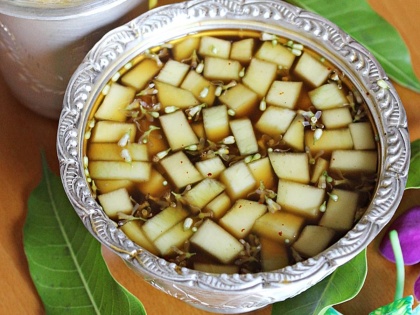Ugadi 2024: Know How Traditional Dish 'Ugadi Pachadi' Is Made and Its Cultural Importance
By Lokmat English Desk | Published: April 4, 2024 01:25 PM2024-04-04T13:25:19+5:302024-04-04T13:35:25+5:30
Ugadi is a festival that marks the beginning of the New Year according to the Hindu lunisolar calendar, also ...

Ugadi 2024: Know How Traditional Dish 'Ugadi Pachadi' Is Made and Its Cultural Importance
Ugadi is a festival that marks the beginning of the New Year according to the Hindu lunisolar calendar, also known as Panchanga. This festival is majorly celebrated in the states of Andhra Pradesh, Karnataka, Telangana, and Goa in India. On this day One of the most important traditions is the preparation of a special dish called "Ugadi Pachadi," which is made from jaggery, green pepper, salt, neem flowers, tamarind, and raw mango pieces. This dish is symbolic of all the flavors of life and is believed to bring good fortune and happiness in the coming year.
Ugadi Pachadi Recipe.
The dish is made with a combination of six ingredients that represent the six tastes of life: sweet, sour, salty, bitter, pungent, and astringent. The ingredients used in the dish are tamarind, jaggery, raw mangoes, neem flowers, black pepper powder, and salt.
To prepare Ugadi Pachadi, tamarind is first soaked in water for about 40 minutes to 1 hour. Then, the tamarind pulp is squeezed and kept aside. In a bowl, the tamarind pulp is mixed with water, chopped jaggery, and finely chopped raw mangoes. Neem flowers are then added to the mixture, and black pepper powder and salt are added to taste. The dish is traditionally offered to the deities as naivedyam before serving it to the family.
The ingredients used in Ugadi Pachadi are chosen carefully to represent different aspects of life. The sweet taste of jaggery symbolizes happiness, while the sour taste of tamarind represents unpleasantness. The salty taste of salt represents fear of the unknown, and the bitter taste of neem flowers represents sadness. The pungent taste of black pepper powder symbolizes anger, and the astringent taste of raw mangoes represents surprise.
Ugadi Pachadi is an essential part of the Ugadi festival and is believed to bring good fortune and happiness in the coming year. The dish is also said to awaken the taste buds and prepare the body for the New Year's feast.
What Ugadi Stands for and Muhurat.
The name Ugadi is derived from the Sanskrit words "Yuga" and "Adi," which mean "age" and "beginning," respectively. This year Ugadi is falling on 9th of April. Pratipada Tithi starts at 11:50pm on 8th of April and ends at 8:30 Pm on April 9.
Open in app